-
Posts
36 -
Joined
-
Last visited
Content Type
Profiles
Personas
Wiki
Rules
War
Systems
Safety
Player Conduct
Forums
Forms
Posts posted by IEC
-
-
[!] Another issue of the Empire’s public newspaper, the Imperial-Parliamentary Affairs Network, has been published. Consumers purchase the newspaper at three minae a copy – what a bargain!
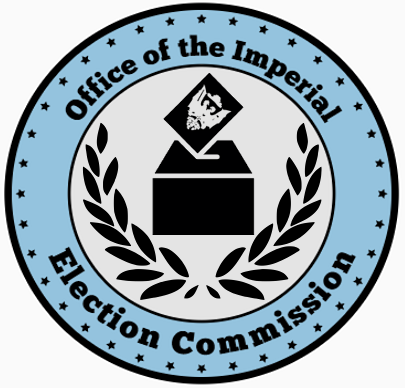
13th of Horen’s Calling, 1688
Third Issue
Brought to you by the Imperial Election Commission
The Imperial-Parliamentary Affairs Network, otherwise abbreviated to I-PAN, has been established as a journalistic outlet to inform the Empire’s constituents of the public affairs occurring from within the Imperial Parliament, and other important political topics within the realm. I-PAN shall be a nonpartisan, neutral news outlet which covers a variety of political affairs and happenings in the Empire. I-PAN was established under the supervision of the Imperial Election Commission in 1687, as a method to combat a disturbingly low amount of journalistic news outlets in the Empire. I-PAN shall be very strict in our core principle of prohibiting biased articles. An Imperial outlet, funded by the constituents, do not deserve slanted news or unfair coverage of individuals. We are wed to facts, and facts alone.
If you are an aspiring journalist tempted by the allure of this newly established outlet, feel free to contact Fabius Bracchus, Election Commissioner ((Liam#7649)) to become a Parliamentary journalist. Trusted and worthy journalists shall be given press credentials to Parliamentary sessions, in order to cover current affairs. In addition, we encourage journalists to also establish private news outlets, to expand the journalistic integrity and ability to publicize information. They, too, may receive press credentials, and are not subject to the same standards as public journalists are. However, as far as I-PAN is concerned, we shall provide the utmost neutral coverage.
Without further ado, the news.

PREFECT SARKOZIC RESIGNS; CARRION APPOINTED TEMPORARY PREFECT
Just a mere four Saint’s days following the Parliamentary general elections, John Hugh Sarkozic, who won the Belvitz prefecture seat by a mere six points, has quietly announced his resignation. The former Prefect-elect’s rationale included accusations of “election rigging” against the CCP candidate’s political ambitions, labeling the various electoral oversight agencies as being slanted in favor of his opponent, Ostrobor Carrion. This comes after an investigation was launched into the Belvitz election, amidst accusations that “deceased voters” had participated in the elections. The investigation yielded no conclusive results.
In accordance to the Statute of Carolustadt (V.II.IV), a by-election is to be held, nominating a new Prefect to serve in Parliament. This election, however, will likely follow the first session of Parliament, scheduled for the 12th of Tobias’ Bounty, 1688. Until a by-election can be organized, Priorist nominee Ostrobor Carrion has been appointed to serve as the temporary Prefect for the Belvitz seat. He will likely serve for roughly one Saint’s week. Carrion also has the option to run for the seat himself, should he wish to serve a full term as Prefect.
Belvitz has decidedly become a “tossup” seat for both parties, being the only present Prefecture with mixed political results. The Common Civic Party only secured their seat by a six point lead, which means that if the Priorist Party wishes to retain their newly acquired seat, they’ll need to sway some of the CCP voters in the district to vote Priorist, or encourage those who didn’t vote in the last election to vote in the upcoming by-election. In contrast, the CCP will need to defend their reputability, and locate a suitable replacement candidate for the district.
The CCP nor the Priorist Party have made comments on the matter as of yet.
PARLIAMENT SCHEDULED TO MEET IN THREE SAINT’S DAYS

Speaker of Parliament and Lord Keeper of the Privy Seal, Alexander Frederick, has scheduled the first session of Parliament to be hosted on the 12th of Tobias’ Bounty, 1688. After this meeting, the five year terms for elected Prefects will begin.
Here are some future hot button issues which will likely be debated in Parliament;
Voter Suffrage
Ever since the establishment of the Parliament, voters and political candidate alike have been calling for expanded voter suffrage. To many, the currently drafted Prefectures offer little representation to a large portion of the Empire, offering representation only to some urban areas. Robert Sigismund, Prefect-elect of Markev, made it one of the focal points of his campaign. Multiple barons have also called for expanded voter suffrage, namely in their holdings. The debate will likely not be along partisan lines, but instead between those who wish to see the Parliament take radical steps towards pro-legislative reforms, or if leadership should take the process more cautiously when considering voter expansion.
Merit-Based Knighthood
One of the Priorist Party’s promises during the elections, representatives in Parliament will likely be drafting up a bill to propose merit-based knighthood standards. A common critique as of the current knighthood process is that obtaining knighthood status is far too common, and the process must be overhauled to more accurately reflect the contributions made by individuals obtaining the aforementioned title. “Knighthood is given out to landed nobles,” noted PPR chairman Hans Rovin in an interview. “The issue with this is that some nobles are warriors and others are burghers. The warriors fight. Burghers write.”
Taxation
Both major parties tend to agree on the overall concept of having little to no imperial taxation, leaving the matter of funding to the vassals. However, it is unclear how other independent Lords in the Parliament will view the matter. Regardless of anyone’s opinions on taxes, the Imperial government needs to garner a budget from somewhere. Solutions proposed by the CCP have been block grants to vassal states, whereas the PPR has suggested eliminating the need for Imperial taxes by granting more economic responsibility to the vassals.
Cultural Integration
Easily the most divisive issue in the ‘87 elections, the CCP and PPR have been on staunchly opposite ends of the spectrum when it comes to debating cultural integration. While the PPR embraces a more ethnocentric, nationalistic message, advocating to retain traditional Renatian values, the CCP has long since advocated for the gradual integration of cultural minorities into society, justifying such through promises of economic prosperity for all of the Empire’s constituents, and a decreased sense of inter-polarization.
International Trade
Another issue which drives a wedge between the PPR and CCP is the matter of tariffs versus free trade. While the Priorist Party advocates for enacting tariffs on merchants who wish to trade with individuals and businesses outside of the Empire, in order to disincentive foreign investments and keep Imperial business ties in the Empire, the CCP has decried such, rebutting by stating that free trade is keeping our affluent economy afloat, and that without it, our domestic production would have to skyrocket in order to keep up with demands.
We fully expect these essential issues to be debated on the national scale in the days to come.
5 -
[!] An educational handbook is published by the I.E.C, and distributed to all future members of Parliament.
IMPERIAL PARLIAMENTARY PROCEDURE GUIDE
✠

1687
Brought to you by the Imperial Election Commission

The Imperial Parliament, otherwise known as it’s formal title, The Great Council of the Imperial Crown of the Exalted Godfrey, may have a foreign legislative procedure to some Parliamentary newcomers. To ensure that all participants of this house function to it’s fullest necessity, the Imperial Election Commission has published this missive in order to outline the day to day procedures in Parliament.
Chapter I
- Composition of Parliament
- Powers of Parliament
Chapter II
- Parliamentary Etiquette
- Political Alignment
Chapter III
- Proposition & Scheduling
- Debate
- Voting
- Ratification
- Judicial Review Process

Chapter One: The Basics
Composition of Parliament
The Imperial Parliament is composed of roughly four different voting bodies; The Lords Temporal, which makes up the bulk of the body, the Lords Spiritual, the Privy Council, and the elected Prefects. In addition, the Parliament also contains two non-voting members and His Imperial Majesty. The Imperial Parliament is odd in this early stage, as there is no set number of sitting members.
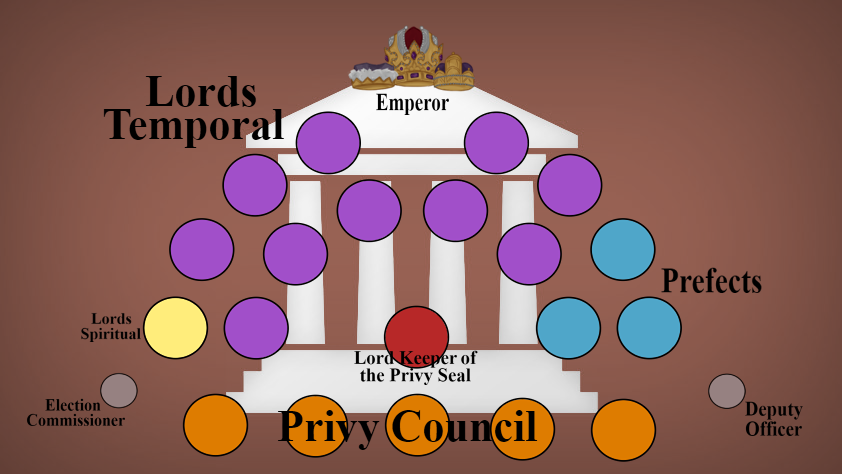
The Emperor is the utmost, autocratic force in Parliament. Although His Imperial Majesty technically doesn’t vote during hearings, he has the ability to “sit-in” at any time he so desires. It is his primary duty to utilize the opinions of the Members of Parliament, in order to make informed decisions whilst governing.
The Lords Temporal include land-governing nobility, such as margraves, dukes, counts, barons, and kings. These Lords are appointed by His Imperial Majesty, under the advisement of the Lord Keeper of the Privy Seal, once every five years, before the new term begins. Often times, the Emperor shall select noble members who will represent the Empire well, and be active participants in the Parliament.
The Lords Spiritual includes land-governing members of the clergy, such as Prince-Bishops or Prince-Archbishops. They undergo the same process as the Lords Temporal, but often lack in the same proportionate amount in comparison to their larger counterparts.
The Prefects are elected individuals, chosen by the common folk of the Empire once every five years. They retain equal voting powers to the rest of the body, but are unable to reserve their seat based on hereditary ties, but rather by pleasing their constituents and getting re-elected after five years. Similarly to their other counterparts, the number of Prefects serving in Parliament could fluctuate, depending on the future number of determined Prefecture districts in the Empire.
The Privy Council includes every member of the Imperial administration, appointed directly by His Imperial Majesty. This includes the Arch-Chancellor, Arch-Seneschal, Grand Knight, Chamberlain, Grand Marshal, Chief Justicar, and the Imperial Engineer.
The Lord Keeper of the Privy Seal, also a member of the Privy Council, acts as his own individual body during Parliamentary sessions, acting as the Speaker of Parliament. He organizes debates, determines who is allotted to speak before the floor of the Parliament, and keeps the process moving along. He is also appointed directly by His Imperial Majesty.
The Deputy Officer, or Deputy Speaker, is appointed by the Lord Privy Seal. They act as a proxy on behalf of the Speaker of Parliament. When the Speaker is absent, but a session of Parliament must be hosted, the Deputy may act in place of the Speaker and host the Parliamentary session. When the Speaker is present, his job is then to keep order in the chamber, and assist the Lord Privy Seal in keeping the day on schedule. The Deputy Speaker is a non-voting member.
The Election Commissioner is appointed directly by His Imperial Majesty. It is his duty to organize elections for Prefect seats. He also acts as the default scribe for the chamber, filing and delivering legislative paperwork. He is the chief bureaucrat. He is a non-voting member.
Powers of Parliament
The Imperial Parliament, in accordance to Article III, Section II, Subsection II, the powers of the legislature are as follows;
- To propose legislation
- To present a non-binding writ or proclamation
- To review executive actions
- To revive previously failed propositions
- To review and investigate the actions of government agents
- To attainder individuals
- To establish caucuses and committees alongside fellow members of Parliament, to unify members with similar objectives
- To vote on proposed measures
All voting members of Parliament share these powers. The additional power of Parliament Speaker is delegated to the Lord Privy Seal. Another additional power, delegated to all members of the Privy Council, is to schedule future meetings under the consultancy of the Lord Privy Seal. Members of the Privy Council may also be referenced when inquiring about specific policies being debated, acting as an invaluable resource analyzing the insight into different Imperial departments.
Chapter Two: Formalities
Parliamentary Etiquette
The Imperial Parliament holds a very loose standard of etiquette for those serving. All male members are expected to wear a standard waistcoat or suit in some variation of bland colors, such as black, brown, grey, or a dark blue. Hats are not permitted. Female members should wear formal gowns accompanied by a bodice, consisting of similarly bland colored attire, such as black, brown, grey, or a dark blue. Armor is strictly forbidden, except by His Imperial Majesty, the Grand Knight, and the Grand Marshal. Members of the Lords Spiritual are exempt from the aforementioned attire, instead being requested to wear their religious garbs.
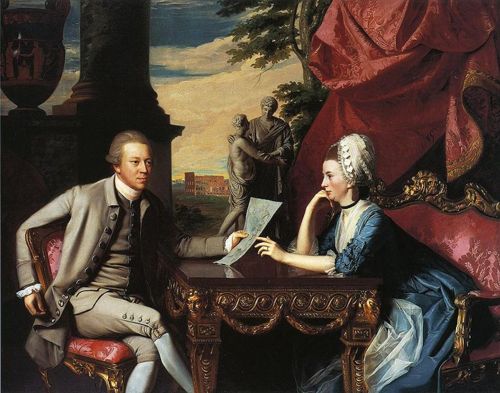
Members of Parliament should always refer to their colleagues as either “The Honorable Gentleman/woman,” or refer to other members by their noble titles. Alternatively, one may also address one as “Mister, Miss,” or “Missus.” Addressing one by their first name is generally not allowed.
Political Alignment
Multiple political parties exist within the Imperial political scene. Members of Parliament are not obligated to join any political party, and may choose to remain independent candidates. However, if they so wish, they may contact the Election Commissioner and inform them of their party affiliation at any time. It is most common for elected Prefects to align themselves with a political party, and is far more uncommon for noblemen to register with a party. However, nothing is preventing any members from registering with a party or declaring independence, if they so wish.
Chapter Three: Daily Legislative Procedure
For the precise legal text and elaborated procedure, please refer to Article IV of the Statute of Carolustadt
Proposition and Scheduling
Traditionally, the Imperial Parliament will begin by reciting an opening prayer, delivered by a voting member of Parliament at the Lord Privy Seal’s discretion, or the Lord Privy Seal himself. Immediately following the prayer, the Lord Privy Seal shall then deliver a brief press statement, announcing notable actions of the Emperor since the last time they had congregated. He will then ask for members of Parliament to present their proposals. Proposals are requests to debate and vote on a piece of legislation, or a motion to call for a Parliamentary judicial review of a government action or agent. They shall submit their propositions publicly by declaring, “I, [name and title], propose the [title of legislation],” and then seating themselves once again. Proposals are not required to be physically written at the time of their proposition, but must be drafted by the time of it’s debate. After the submission of the proposal, the Lord Privy Seal shall then allot a sufficient amount of time to debate the bill before voting, either in the current session, or in the next. He shall then also select a date, no less than a Saint’s Day after it’s proposition, to vote on said legislation. Voting and debating may occur on the same day, but voting and propositions may not, unless the proposed legislation falls within one or more of the following categories;
- Legislation commissioning works of public art
- Legislation proposing the renaming of public roads, bridges, or other public works
- Legally non-binding writs or proclamations
- Any legislation is exempt from the “minimum time” rule, should an eight-tenths quorum be in attendance
- Judicial review sessions may be proposed and voted on in the same session
The above exceptions to the minimum time rule are not exempt from debate.
Debate
After the Lord Privy Seal announces the public schedule for voting, the Parliament may then assemble for debate, either in that current session or in the next congregation. He shall begin the debating session by stating, “We shall now open debate for the [title of bill], sponsored by [name of sponsor].” He shall then allow the sponsor of said legislation to deliver an opening statement, then calling on those who wish to speak to deliver dissenting or concurring statements. Debate may occur for any amount of time, at the discretion of the Lord Privy Seal, so long as proper debate is allotted. The sponsor of the bill may request more time to debate before voting, if they so wish. The Deputy Speaker must also ensure debate occurs smoothly, and that no single legislation utilizes a wasteful amount of debate time.
Voting
Following the debate session, the bill may then either be immediately voted on, or, if the sponsor so wishes, may be deferred to the next session of Parliament. Come time to vote, the Lord Privy Seal shall state, “We will now vote on the proposed legislation. All those in favor of the [title of bill], say ‘Aye’,” followed by all those in favor of the proposed measure stating “Aye.” He shall then proceed by stating, “All those opposed, say ‘Nay’,” followed by all those in opposition of the proposed measure stating “Nay.” Any individuals who remain silent shall be considered as abstained votes. He shall then tally the votes, either declaring that the bill has passed or failed, then moving along to the next item on the itinerary.
Ratification
All passed legislation shall then be delivered to the Emperor’s throne. He will review such, and may either sign the bill into law, in which it shall become effective immediately, lest the bill states otherwise. Alternatively, he may reject it, sending it back to the Parliament. If he should choose to reject legislation, he must draft a statement justifying his dissent. If the sponsor so wishes, they may revive the legislation, making any necessary alterations. If the Emperor neither signs nor rejects legislation after a Saint’s week, the bill shall then automatically become law.
Judicial Review Process
When reviewing the legality of a government program, action, or individual, the Parliament may summon individuals and inquire about the item in question. To initiate a judicial review, three-tenths of the Parliament must agree with initiating the process. Proposition, debate, and voting may all occur in the same session. The Lord Privy Seal shall then schedule a time to summon the individual in question before the Parliament, allowing members of Parliament to interrogate the individual in question.

This guide serves only as a basic handbook for members of Parliament, scratching only the tip of the iceberg. There is far more to learn about the legislative process, but we do hope that this was a sufficient basis to assist you in your endeavors in the Imperial legislature.
3 -
[!] The most riveting, exciting moment in recent Imperial politics – nay, politics as a whole had finally arrived, late into Election Day. The polls had been closed, and the I.E.C’s staff had tallied the ballots together. All that was left was to announce the victors.
IMPERIAL PARLIAMENTARY ELECTION RESULTS, 1687
✠

17th of Tobias’ Bounty, 1687
Brought to you by the Imperial Election Commission

After a long campaign year, the votes had finally been tallied. With the polls closing, it took the I.E.C. nearly a Saint’s hour to verify and count the ballot boxes, determining the victor from each city. We would first like to congratulate all of our candidates, even those who didn’t make it to the general election, for partaking in this unique and nearly unprecedented system. You have contributed to the future of the Empire. We also wish to thank the voters for performing their civic duty as patriots, exercising the political power bestowed upon them.
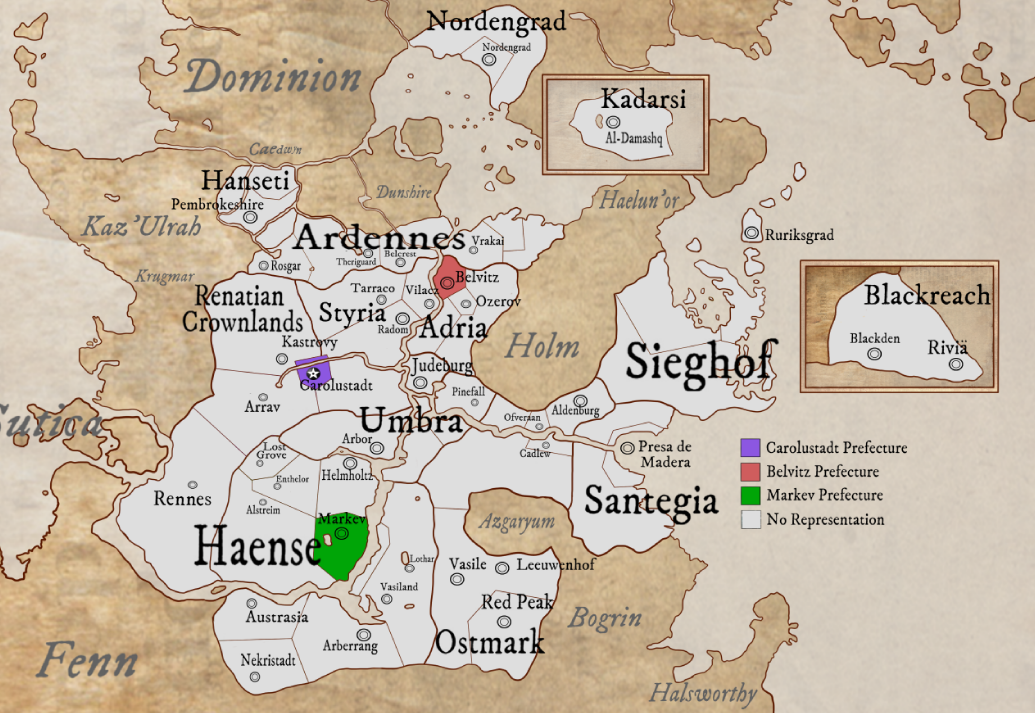
[!] The Parliamentary election map, as of 1687.
1687 Parliamentary Election Results
Carolustadt – PRIORIST VICTORY
Victoria Oxenstierna-Mühlen (PPR) – 69.7% ((33))
Cesare di Lucio Accorsi (CCP) – 30.3% ((10))
Belvitz – CCP VICTORY
John Hugh Sarkozic (CCP) – 53.8% ((7))
Ostrobor Carrion (PPR) – 46.2% ((6))
Markev – CCP VICTORY (UNCONTESTED)
Robert Sigismund Barbanov (CCP) – 100% ((9))
Analysis
These election results mean that the CCP will likely enter Parliament as the populist force, with the majority garnered of Prefect seats. The Lords Temporal, Spiritual, and Privy Council are another story, however. Depending on how the Peerage vote, the CCP may still be a minority to the Priorist Party and their affiliates. However, they’ve secured two new seats for the first upcoming session of Parliament.
The election result in Carolustadt was surprising to some CCP voters who expected the prior accusations of violent outbursts and mob mentality to have severe consequences on voter turnout. However, it seems that the candidate herself, Prefect-elect Victoria Oxenstierna-Muhlen, was able to separate herself from the scandals enough to retain her voters. This is surely a large success for Priorists, after a well fought campaign. Oxenstierna will serve in Parliament for the next five years as the representative of Carolustadt.
In Belvitz, nobody knew what the outcome would be. A Priorist candidate, Ostrobor Carrion, joined the race at the last minute, competing against former Duke, John Hugh Sarkozic. Ultimately, however, Sarkozic's success can be largely attributed to campaign strategies utilized by the Priorists in Carolustadt; on-the-ground interaction, retail politics, communicating with voters, and delivering a populist message. Sarkozic is presumed to serve for the next five years as the representative of Belvitz.
Palatine and frequent Haensetic political figure, Robert Sigismund, did not have a contender. This is attributed to the belief that the vast majority of Haensetians are members of the CCP, and the Priorist Party didn't wish to bother utilizing their resources in the south. Voter turnout in Markev was low, despite their high voter registration rate. Though, this is thought to be because of the fact that there was practically no election, and no real reason for voters to attend the polling stations. Robert Sigismund will serve for the next five years as the representative of Markev.
Belvitz Recount
Due to the close proximity of the Belvitz election results, the I.E.C. has impounded the ballots in the Adrian city to recount the votes. Accusations of “dead citizens” registering to vote have been lobbed about, in addition to general unrest about the dangerously close tally. As for now, John Hugh Sarkozic is presumed to be the victor of the district until otherwise notified.
We thank the voters once again for participating in this experiment. We hope this new political infrastructure brings more dynamics to our policy crafting decisions, and empowers everyone in the Empire to contribute their two minae.
Thank you.
18 -
[!] As the elections arrive, an urgent issue of the Imperial public newspaper is published.

2nd of Tobias’ Bounty, 1687
Brought to you by the Imperial Election Commission
The Imperial-Parliamentary Affairs Network, otherwise abbreviated to I-PAN, has been established as a journalistic outlet to inform the Empire’s constituents of the public affairs occurring from within the Imperial Parliament, and other important political topics within the realm. I-PAN shall be a nonpartisan, neutral news outlet which covers a variety of political affairs and happenings in the Empire. I-PAN was established under the supervision of the Imperial Election Commission in 1687, as a method to combat a disturbingly low amount of journalistic news outlets in the Empire. I-PAN shall be very strict in our core principle of prohibiting biased articles. An Imperial outlet, funded by the constituents, do not deserve slanted news or unfair coverage of individuals. We are wed to facts, and facts alone.
If you are an aspiring journalist tempted by the allure of this newly established outlet, feel free to contact Fabius Bracchus, Election Commissioner ((Liam#7649)) to become a Parliamentary journalist. Trusted and worthy journalists shall be given press credentials to Parliamentary sessions, in order to cover current affairs. In addition, we encourage journalists to also establish private news outlets, to expand the journalistic integrity and ability to publicize information. They, too, may receive press credentials, and are not subject to the same standards as public journalists are. However, as far as I-PAN is concerned, we shall provide the utmost neutral coverage.
Without further ado, the news.

POLLS OPEN IN CAROLUSTADT, MARKEV, BELVITZ

[!] The Theodosian Municipal Library, located in Markev, Haense, to be the polling location for residents of Markev; 1687
Election day is today, and polls are officially open. Voters will have a series of candidates to elect, ranging from the hyper nationalist Priorists to the fiscally conservative Common Civic Party. The polling locations are listed below;
- 2 Horen Circle; Carolustadt, Carolustadt Courthouse
- 1 Marius’ Court; Markev, Theodosian Municipal Library
- 6 Soothsayer’s Circle; Belvitz, Belvitz Town Hall
The candidates are as follows;
CAROLUSTADT
Victoria IV Oxenstierna-Mühlen
Priorist Party of Renatus
Cesare di Lucio Accorsi
Common Civic Party
MARKEV
Common Civic Party
BELVITZ
John Hugh Sarkozic
Common Civic Party
Ostrobor Carrion
Priorist Party of Renatus
The vast majority of registered voters – over 100,000 ((100)) in total – have already received their voting identification cards needed to vote. If you’re one of the individuals who haven’t yet picked up their card but has already applied for such, you may pick up your card today at 6 Godfrey Sq., in the Imperial Election Commission’s office, by contacting either Fabius Bracchus, Owen Gromach, Theodoric de Ruyter, or Alexander Frederick.
We urge you to vote today, as it is your civic duty!
((Voting is operational from 9am EST – 12am EST, midnight))
BREAKING: PRIORIST RIOT LEADS TO SCANDAL

[!] Members of the Priorist Party’s “Blackshirt” faction draws arms upon both the Imperial Legion and Robert Sigismund’s personal detail; 1687
On the 17th of Godfrey’s Triump, 1687, only last Saint’s night, Palatine Robert Sigismund and Markevian prefect candidate arrived to the Imperial capital of Carolustadt to deliver a stump speech, as apart of the Common Civic Party’s last ditch effort to campaign in Carolustadt for their nominee, Cesare di Lucio Accorsi. He arrived accompanied by about five Haense bodymen on his detail, and another fifteen or so Renatian legionaries. The speech delivered by Palatine Sigismund is detailed below;
Spoiler“Greetings great people of Carolustadt and my fellow man. I arrive here in our great capital on the eve of the general election where so much is at stake as you, the people, decide what kind of a government we ‘ought to have. This election represents the vision of an Empire that is poised to maintain our strength and might as humanity grows ever fuller in its bountiful success.
This is quite precisely what the Common Civic Party stands for in this election: an Empire that cultivates an economy that is equally prosperous for the Renatian, the Haeseni, the Curonian, the Illatian, the Belvitzian, and so forth. Wealthy and prosperity begins in the hearths of the many homes across our realm and it is the role of the government to protect these aspirations. We believe in integration and vassal success so that everyone in the Empire is afforded the equal share in the benefit of the Realm. This is why we support expanding voting rights to more places across the the Empire. The Common Civic Party believes in incentivizing our vassals and our capital alike, ensuring that their success is the success of the whole. Loyalty to the Emperor is a gesture not just of formality but a true reality that yields harmony.
We believe in securing our future, guided by the Canon, to stifle material pleasures by ending the drug trade that inflicts harm on so many morals and lives. We strongly support smaller taxes to lessen the burden on the majority of the people and allowing for the full growth of business and marketplaces to flourish. We support free trade and the movement of goods and labor to create an economy accessible to all merchants and commerce. Laws need to reflect the safety of our people. The roads are dangerous and not everyone has the luxury of armed guards to travel with them. This is why we support safety legislation that provides secure checkpoints along our roads. We need not worry about the superiority of our culture for we know that GOD sustains the upright. The challenge facing our time is the unity we must preserve so that our cultural might can grow for the many generations after. We must make allies and integrate all to an industrious society, promoting the civilization given to us by the Creator to fully appreciation and creation around us.
And so my friends, your cause is our cause. With your help, this vision can become our reality. VOTE for Cesare di Lucio Accorsi to the Parliament of the Empire. The time is now to act and seize upon what lies ahead of us! Thank you all and may GOD bless our Empire!”
“Of course, those who break the law should face justice.” Those were the words of Priorist Chairman Hans Rovin, responding to allegations of the “mob mentality” of the Priorist Party, stating that although the organization itself was nonviolent, dissenters and rioters should be prosecuted for transgressions. A simple day later, during the Palatine’s speech, seven members of the Priorist Party’s “Blackshirt” wing, the paramilitary soldiers endorsing the party’s platform, rallied in front of the politician’s stand and made an attempted assault on the line of Renatian legionaries. Ultimately, being outnumbered three to one, the Renatian armed forces were able to quell the rioters and slay the majority of the traitors. Palatine Robert Sigismund escaped with multiple cuts and bruises, protected by his security detail.
This has led the Imperial administration to banish the paramilitary wing of the Priorist Party, only one day before the elections. Although the party itself would remain in tact, the self proclaimed “Blackshirts” would no longer be permitted within the Empire, being labeled as a domestic terrorist organization. Priorist Party banners were then ordered to be taken down from around the city. “Let it be known that the Priorists attacked first,” proclaimed legionary Thorley Fitch.
The attacks on the Palatine are the third instance of violence from Priorist Party members, and is expected to have a negative effect on their chances in the elections. However, will it be enough to defeat their chances of victory? Their candidate, Victoria Oxenstierna, has remained a respectable figure in local politics thus far, and has refrained from any of the aforementioned violence in the capital. Thus far, as has her opponent, CCP candidate Cesare di Lucio Accorsi, who was a victim of an aforementioned assault by Priorist Party members.
The real question is if this will sway the minds of voters before they go to the ballot boxes, or if they’ll place aside the recent scandal to vote for the candidate herself.
If you are an aspiring journalist tempted by the allure of this newly established outlet, feel free to contact Fabius Bracchus, Election Commissioner ((Liam#7649)) to become a Parliamentary journalist. Trusted and worthy journalists shall be given press credentials to Parliamentary sessions, in order to cover current affairs. In addition, we encourage journalists to also establish private news outlets, to expand the journalistic integrity and ability to publicize information. They, too, may receive press credentials, and are not subject to the same standards as public journalists are. However, as far as I-PAN is concerned, we shall provide the utmost neutral coverage.
9 -
[!] The Imperial Election Commission’s couriers strive to mass produce and deliver a writ to every registered voter in the Imperial Capital.
THE CAROLUSTADT MAYORAL ELECTIONS

✠
The Imperial Election Commission
Issued and confirmed by His Imperial Highness, Alexander Frederick, Privy Seal of the Imperial Crown of Godfrey, 14th of Godfrey’s Triumph

TO ALL LOYAL SUBJECTS OF THE IMPERIAL CROWN,
We see fit to, in conjunction with the Imperial Election Commission, announce the first official mayoral election for the Imperial City of Carolustadt. The elections shall take place in three Saint’s Days ((SATURDAY 27TH)), to coincide with the Prefecture elections.
Each established party is granted the ability to propose one candidate to be elected upon on the polling day, with any notable citizen of Carolustadt being able to nominate themselves to run independent of other parties.
The requirements to run for mayoral office shall roughly coincide with the requirements to run for Prefecture. They are as follows;
- To be at least 20 years of age
- To be a full-blooded human
- To subscribe to the Canonist faith or a denomination of such
- To posses the ability to read or write proficiently
- To be of Burgher, Yeoman, or Gentry social status
- To own property in your Prefecture, such as a house
Please submit the following application to the I.E.C. to register for candidacy;
Full Name:
Address:
Party Affiliation:
Policy Platform:
We thank you for your interest in local government. The mayoral position is often an underappreciated one, and we trust the residents of Carolustadt to choose their municipal leader wisely.
2 -
[!] An Imperial writ is publicized for residents to view.

13th of Horen’s Calling, 1687
Brought to you by the Imperial Election Commission

The First Edition of the Imperial-Parliamentary Affairs Network
The Imperial-Parliamentary Affairs Network, otherwise abbreviated to I-PAN, has been established as a journalistic outlet to inform the Empire’s constituents of the public affairs occurring from within the Imperial Parliament, and other important political topics within the realm. I-PAN shall be a nonpartisan, neutral news outlet which covers a variety of political affairs and happenings in the Empire. I-PAN was established under the supervision of the Imperial Election Commission in 1687, as a method to combat a disturbingly low amount of journalistic news outlets in the Empire. I-PAN shall be very strict in our core principle of prohibiting biased articles. An Imperial outlet, funded by the constituents, do not deserve slanted news or unfair coverage of individuals. We are wed to facts, and facts alone.
If you are an aspiring journalist tempted by the allure of this newly established outlet, feel free to contact Fabius Bracchus, Election Commissioner ((Liam#7649)) to become a Parliamentary journalist. Trusted and worthy journalists shall be given press credentials to Parliamentary sessions, in order to cover current affairs. In addition, we encourage journalists to also establish private news outlets, to expand the journalistic integrity and ability to publicize information. They, too, may receive press credentials, and are not subject to the same standards as public journalists are. However, as far as I-PAN is concerned, we shall provide the utmost neutral coverage.
Without further ado, the news.
PRIORIST PARTY RIDES POPULIST WAVE IN CAROLUSTADT; FACES CRITICISMS FOR “VIOLENT RECORD”

A group of Priorist Party members convene for their Convention, with the Priorist Triangle, their party logo, flying in the wind; 1686
In the Imperial Capital of Carolustadt, the most populated urban settlement on Atlas, the Priorist Party of Renatus has taken hold of the local political scene. Initially established by party chairman Hans Rovin to become a nationalist lobbying effort, it has now spurred into the most notable force in the early era of democratic Imperial politics. The question is – why? Why has such a seemingly radical political body begun to guide the national political narrative?
Many have attributed the Priorists’ recent political upheaval to populist rhetoric and policies. In contrast to previously established political organizations, the Priorist Party demonstrated their lack of caution when criticizing the Imperial administration, which appealed to a large portion of Imperial citizens. Established only twelve annum ago, the city of Carolustadt has experienced a large lack of formal employment. The majority of the city’s residents are employed as bureaucratic secretaries, military personnel, or low paying service industry jobs. It is evident that, in the realm of economics, the Empire of Man has experienced a shortfall when compared to their foreign counterparts. The Priorist Party has touted their positions on supporting the gentry, describing wealthy peasants as a “lessening middle-class” which they wish to embolden. “Is it wrong, I ask, to represent the working class?” inquired notable Priorist Party member, Cousin Otis, in a public writ earlier this Legacy. “We are under the boot of poverty,” party advocate and Emperor’s grandson Cassius Horen elaborated. The very fascinating portion in regards to the Priorist Party’s policy positions is that, not only do they promote middle class growth, but they actively scrutinize the burgher and knighthood classes, advocating for the distributions of certain pockets of wealth back into the pockets of workers. Their party platform encourages tariffs on merchants attempting to trade with foreign entities, the establishment of a merit based knighthood system with the abolition of knighthood by bloodright, and even expanded voting rights for citizens. The Priorists have proven themselves to be an abnormal, yet effective force in the realm of Renatian politics.
With that said, certain officials from within the Priorist Party continue to face heavy criticism from notable individuals for their violent reputation. Back in the Harren’s Folley of 1686, a Priorist rally quickly turned into a belligerent street battle, between party leaders and a visiting Dwarven diplomat. Conflicting eyewitness accounts dispute which combatants initiated the conflict, but all reports have come to the same consensus. Prior to the outbreak, party advocate Cassius Horen was delivering a speech relating to racial and ethnic purification.
“Far too long have we been stepped on by inferior races, by people to mooch off our own homes, and wealth. My blood, the sons and daughters of Horen cursed to the poverty caused by foreign, alien influences.” - Cassius Horen, 1686
This quote was delivered an estimated ten Saint’s minutes prior to the outbreak, which was then accompanied by chants of, “Slaughter the Orcs,” “Death to shitskins,” and “Burn the Darkies.” It is still unclear if the Dwed in question was assaulted by a fervor of upset constituents, or if he had instigated the violence after being offended by the public speech. After being placed into temporary custody, Cassius Horen had willingly offered public comments, elaborating on the matter. “I gave a speech – People who heard the speech must’ve been upset and taken the words to heart, most folks only know violence nowadays to let out the feelings they have for those they dislike. Words can do very little when you’re under the boot of poverty.” When asked if he supported the Priorist outbreak, he fervently denied such, stating that Priorists did not subscribe to violent tactics, instead justifying such through being a natural part of the democratic process. “My words were for fellow man – For those who expressed similar views, the audience, the words took them in alternative purpose. Such is the way of life, riots and such. Violence isn’t our answer or policy to reach where we’ll be, but it’s a natural occurrence to any habit of conflicting views.”
These comments also come after CCP candidate, Cesare di Lucio Accorsi, was allegedly beaten by Priorist advocates after insulting them in a separate incident a day later, by calling them “Uncanonist.” We spoke to Theodoric de Ruyter, Archbishop of Markev, inquiring about the principles of Canonism applied to the modern day political scene. He immediatley began by condemning the attacks. “Obviously I’m not one to condone the beating of any good Canonist, regardless of any verbal disagreements.” However, when asked if di Lucio’s claims of the Priorist Party being “Uncanonist” were correct, the Archbishop had an interesting response. “I don’t see it as such,” he began. “Obviously, the attack on His Grace, Prince-Bishop Claudius, in the Priorist mission statement, was not called for, but their policy platform doesn’t seem anti-Canonist. Which leads me to believe that they aren’t anti-Canonist per say, although they could do more to promote faith sponsored legislation.” When asked if any of the political parties were pro-Canonist, de Ruyter replied by stating, “Aside from the Nordish Defense League, they do all appear largely secular. Disappointing, but unsurprising.”
Priorists have seen recent success in the Carolustadt prefecture by means of economic populism. However, if they wish to witness success in other Prefectures in future elections, critics state that the Priorists will have to dispel the narrative that they’re composed of “violent mobs.”
SEVENTIAN RIGHTS LOBBY, REFINEMENT PARTY JOIN ALLEGIANCES, FORM COALITION

Common Civic Party candidate Robert Sigismund interacts with voters in Markev after delivering a short speech; 1686
The Seventian Rights Lobby, chaired by Nikatien Drakaene, and the Imperial Refinement Party, previously chaired by Septimius Bracchus, have recently reserved their minimal differences to form a coalition between the two, formerly disorganized political parties. They now harness the political capital expressed by anti-PPR voters, primarily in Belvitz and Markev. The new chair of this coalition party, dubbed the “Common Civic Party,” is none other than Elizaveta Barbanov-Ruthern, a common household name in Haensetian politics. A recent statement from the party summed up the purpose of the creation notes that the party is in favor of human specific multiculturalism, free trade, and block grants to vassals to prevent tax hikes – all policies fervently opposed by the Priorist Party. Chairman Barbanov-Ruthern noted the following in response to Priorist attacks on the newly created coalition;
“Our policies are that of openness and prosperity between humanity’s many vibrant peoples, not meaningless rivalry and one-upmanship. Free trade between the kingdoms will ensure that gold, food and treasure flows in ever greater quantities, and that soldiers of the Empire never march against one another. Vassal control of funds will allow them to invest in what they know to be most needed in their particular realm, rather than some unaware bureaucrat in the capital. Whereas the prevention of tax increases will ensure that the citizenry remains peaceful and enriched. The benefit of Renatus is not necessarily the benefit of us all. But if we should all benefit, so shall Renatus.” - Elizaveta Barbanov-Ruthern, 1687
The party has recently garnered three new notable members, including Robert Sigismund, candidate for Markev’s prefecture, John Hugh Sarkozic, candidate for Belvitz’s prefecture, and Cesare di Lucio Accorsi, candidate in Carolustadt’s prefecture. This has made the Common Civic Party the first to establish a candidate running in each established prefecture. A small feat, considering that the first elections have yet to occur. The question remains; can any unified opposition truly beat the Priorist fervor currently present in the Imperial Capital? Time will tell.
POLLS SHOW PRIORIST PARTY WITH STRONG LEAD OVER CCP IN CAROLUSTADT


A recent poll was conducted by the I.E.C., among one hundred ((10)) likely voters across the three prefectures, in each respective city, measuring candidates’ favorability ratings. Respondents were chosen at random. Respondents were asked the question, “Which candidate will you likely vote for?” The poll results are below;
Carolustadt; Projected Priorist victory
Oxenstierna-Mühlen +70% (+/- 10)
Accorsi +30% (+/- 10)
Markev; Guaranteed CCP victory
Sigismund +100% (+/- 0)
Belvitz; Guaranteed CCP victory
Sarkozic +100% (+/- 0)
Short of another candidate joining the race last minute, the election results appear to be likely definitive. Without opponents in Markev and Belvitz, the CCP stands to gain ground in the first session of Parliament by default. In contrast, however, the election in Carolustadt has granted the Priorists a populist base to further expand their political reach. Elections will be held in three Legacies. ((Saturday, October 27th))
WORLD NEWS
- Queen Elizaveta of Haense announces pregnancy
- New Consul of neighboring Republic of Holm elected; Former military commander Evan Katke
- Ratibor Rodrigue Carrion, popularly known by his nickname “Red,” wins Adrian ducal election by a vote of 3 – 0
- The Antonius Horen Memorial Road finishes construction, allowing new trade routes to open between Haense, Renatus, and Curon
If you are an aspiring journalist tempted by the allure of this newly established outlet, feel free to contact Fabius Bracchus, Election Commissioner ((Liam#7649)) to become a Parliamentary journalist. Trusted and worthy journalists shall be given press credentials to Parliamentary sessions, in order to cover current affairs. In addition, we encourage journalists to also establish private news outlets, to expand the journalistic integrity and ability to publicize information. They, too, may receive press credentials, and are not subject to the same standards as public journalists are. However, as far as I-PAN is concerned, we shall provide the utmost neutral coverage.
We appreciate your patronage through this wonderously terrifying national experiment. It truly is a riveting time for human politics – may it be a productive one.
8 -
VOTER INFORMATION GUIDE
1687 Edition
✠
Imperial Election Commission

Penned by Election Commissioner Fabius Bracchus on the 13th of Harren’s Folley, 1686
 Spoiler
Spoiler((A reminder that elections take place this Saturday, October 27th. Polls are open from 9am – 11pm EST))
This missive shall serve as a guide to the masses of the Empire, who may either be justifiably ignorant as to the electoral procedures, unsure of how to vote, or may simply wish to indulge further in the Imperial Parliament. For reference, please view the following fliers attached on the back of this document;
FOR INFORMATION REGARDING VOTER REGISTRATION, see here
FOR INFORMATION REGARDING CANDIDATE & PARTY REGISTRATION, see here
FOR INFORMATION REGARDING THE MEMBERS OF PARLIAMENT, see here
FOR THE IMPERIAL PARLIAMENT’S LEGAL TEXT IN FULL, see hereCONTENTS
- Election Procedures
- Candidates for the 1687 Elections
- Political Parties
- Election Schedule
- FAQ’s
ELECTION PROCEDURES
Understandably, elections are messy issues nowadays. With this newly implemented process, a litany of voters are at a loss for how to participate in this newly established legislature. Fortunately for the common man, voting in elections is simpler than most would believe. However, voters must be aware of their potential eligibility and/or invalid statuses. As of now, during our experimental phase, the Crown has deemed it necessary to limit voter registration to populated, chartered cities, as means to “test” this endeavor. The three cities eligible to vote are Carolustadt, Belvitz, and Markev, all receiving their own unique voting district, titled as a “Prefecture.” In each Prefecture, voters will select the candidate of their choice, who will then proceed to represent their constituents in the Parliament.

To participate in elections, one must follow a simple protocol.
Register to Vote
All voters must register to vote, regardless of social status. They shall do this via the I.E.C.’s voter registration forum, or by physically walking into the I.E.C.’s office building, located at 6 Godfrey Sq., Carolustadt. Upon registering to vote, you shall be asked to provide your full name, year of birth, city of residency, and address. After such, you shall be assigned a voter identification number, beginning with three digits and ending with another. The first three digits represents your unique voter number, to identify who you are during elections. The final number identifies the iteration of your voter card, which shall change anytime you request a card renewal.
Pickup your Voting Card
Upon registering to vote, your card should be manufactured within one business day. You may pick up your card at the Imperial Election Commission’s office in Carolustadt, at 6 Godfrey Sq. It should look similar to the depiction below;
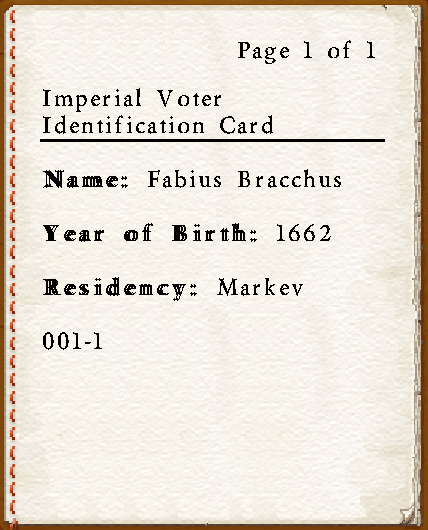
If the information on your card is ever incorrect, you may request a new one.
Vote
Whenever an election for the Imperial Parliament occurs, either in a primary or general, you will use your voter ID card to identify yourself when physically casting your ballot. On election day for the 1687 elections ((Saturday, October 27th )), you will report to your assigned voting station to cast your ballot. The voting poll sites for each Prefecture are as follows;
- Carolustadt – Horen Circle 2, Carolustadt Courthouse
- Markev – Marius Court 1, Theodosian Municipial Library
- Belvitz – Soothsayer Circle 6, Belvitz Town Hall
Upon entering your polling site, a series of ballot boxes will be established. Each shall be labeled with a candidate, accompanied by their political party below. You will then place your voter ID card into the ballot box of your choosing.
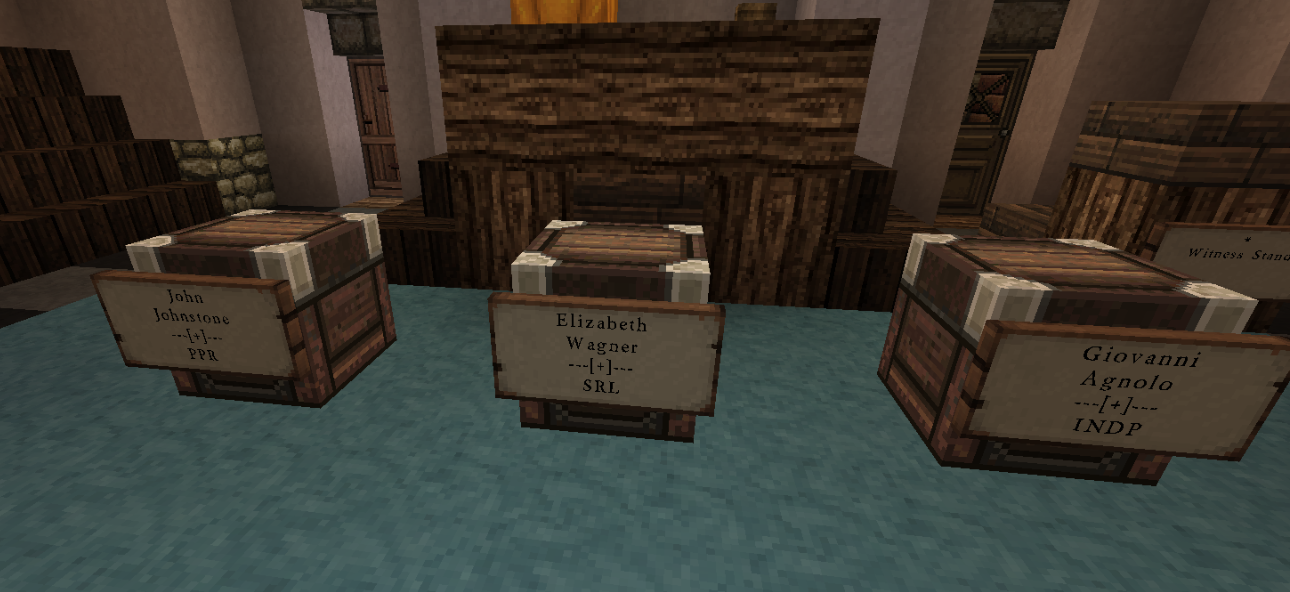
Whilst casting your ballot, you may notice that the ballot boxes will be empty. Ballots are periodically filtered out of the boxes into locked vaults, for security purposes. This is intended to prevent voter fraud and to prevent other voters from seeing foreign ballots.
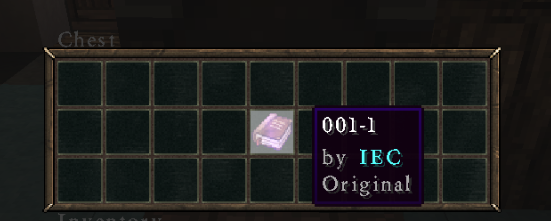
After casting your ballot, you’ve performed your civic duty for this election cycle.
Return Voting Card
After 1 – 2 business days, when ballots are tallied and victors of each respective election are announced, voters may report back to the I.E.C’s office to retrieve their voter card yet again. You should then secure your card in a safe location, so that you may utilize it again in six years.
CANDIDATE FOR THE 1687 ELECTIONS
Individuals who wish to register for candidacy are still eligible to do so. If you’d like to run for public office, please review our candidate guidelines.
CAROLUSTADT
Victoria IV Oxenstierna-Mühlen
Priorist Party of Renatus
Cesare di Lucio Accorsi
Common Civic Party
MARKEV
Common Civic Party
BELVITZ
John Hugh Sarkozic
Common Civic Party
Ostrobor Carrion
Priorist Party of Renatus
MAJOR POLITICAL PARTIES
Priorist Party of Renatus

“The Priorist Party of Renatus is a political organization devoted to capturing the reigns of Government so that it may better serve the interest of the common Imperial citizen. Branching from the tree of Priorist thought and the triad principles of One People, One Nation and One Faith, The Priorist Party remains Nationalist and Devout.”
Chairman: Hans Rovin
Headquarters: 2 Romstun Rd., Carolustadt1. Ensuring a Greater Renatus for the benefit of the Renatian man.
2. Establishing Human-only-Citizenship throughout the Imperium and Human-Only-Membership within the greater Renatian Conglomerate.
4. Ensuring that only citizens of Renatus may vote on matters of a Parliamentary capacity, legislative changes or governmental enactments.
5. Establishing the grounds for a healthy middle class, through the lessening of powers vested in the lower gentry.
Enacting a new Knightly protocol which assigns Knighthood to those who have shown merit rather than bloodright.
Merchants who deal with/from foreign territories shall be tarriffed, with the profits they would have made being redistributed for the public good.
Regulations on Renatian Merchants shall be lifted so that wealth and prosperity may bolster our working class.
7. Ensuring that the State protects suitable health standards by:
Offering protection for mothers and infants
- Preventing children from working in unfavourable conditions or under low income.
- Making a law for compulsory sporting events to help strengthen Renatian tradition.
- Helping to support or create sporting guilds for young men and women.
8. Establishing reforms within the Imperial Renatian Legion, as to look after the ordinary Renatian citizen and not solely protect the rich noble class.
9. Establishing a law that prevents politicians from being anti-Renatian, and bulletins from writing about them. All pieces of legislation, art or books which support foreign, non-human ideals shall be banned.
Common Civic Party

“The Common Civic Party is devoted to upholding the great human values that have persisted in the cultural richness of the Empire. Defined by civic duty, loyalty to Emperor and nation, the party strives and honors its commitments to achieve an economy for all citizens, diplomacy with our allies, prosperity for the people, adherence to the tenets of GOD’s Church, and fidelity to the Empire of Man.”
Chairman: Elizaveta Barbanov-Ruthern
Headquarters: 2 Red Sq., Markev- The protection and promotion of free trade between the vassals and foreign powers to empower an active and strengthened economy.
- Limited centralized Imperial Administrative spending in favor of devolved vassal subsidies.
- A commitment to end the drug trade into the major cities in the Empire of Man.
- Opposing tax hikes that burden citizens.
- Empowering vassal levies and delegating regional and local militant and knight orders to execute the laws of the Empire that better represent their constituents.
- Supporting Imperial legislation to protect the safety of travel within the Empire.
- Promoting the broadening of suffrage rights by passing legislation to admit and protect new charters across the Empire.
- The integration of minority groups and other races to contribute and assimilate as citizens of the Empire.
MINOR POLITICAL PARTIES & ORGANIZATIONS
Seventian Rights Lobby
Chairman: Nikatien Drakaene vem Azar vieren Grata r Sarun
Headquarters: 3 Hawker’s St., MarkevPlatform:
The Seventian People (and all men and women of the Empire) need their rights, and the party therefore votes in favor of any agenda, and will help lobby and vote for, any politician that advocates said rights activism. These are reflected in the practical pillars taken up by the party:
1. Overarching governmental reform in favor of cultural minorities and commonfolk.
2. Lower taxes, Empire-wide.
3. Across-the-board government decentralization to improve localized representation of the people of the Empire.
4. The clearing-up of civil laws in dossiers offered to the common man, improving their abilities to understand their rights and obligations to the Empire.
5. Defending the rights of the Seventian people and other historically oppressed minorities through the improvement of base civil liberties.
Imperial Refineist Party
Chairman: Septimius Bracchus
Headquarters: None
Platform:
- Expand voter suffrage. Utilize the vision of a successful Parliament to expand republican values
- Expand state sponsored social programs to kickstart the economy and bring prosperity to our people
- Assimilate minorities into Renatian culture, to become industrious members of society
- Expand the central Imperial government
- Expand the operations and standards for military excellence
Nordish Defense LeagueChairman: None
Headquarters: Great Hall, Nordengrad
Platform:
1. Lobbying for religious minority protections
2. Defending the rights of true Highland folk in all their clans and tribes
3. Ensuring Wytchery and Wytchcraft is expunged from the Empire in its entiret
4. Protecting the culture, traditions and laws of the Nordish clans.
5. Ensuring Nordish Fyrds are not levied without just cause.
6. Protecting the economic independence of the Markzone
8. Fighting against centralized taxation
9. Lobbying for the right to elect Fatherist Prefects
ELECTION SCHEDULE((October 22nd – 25th)) Time for candidates and voters to submit registration in time for the elections. Potential times for primary elections, if any should need to occur.
((October 27th)) General election day. Polls will be open for the duration of the Saint’s Day. ((9am – 11pm EST))
((October 30th)) First legislative session begins. Parliament can now be called to assemble.
FREQUENTLY ASKED QUESTIONS
What happens if I lose my voter card?
If you lose your voter registration card, please contact the I.E.C. immediately. We shall renew your card and decommission the lost ID, so that any ilk who get their hands on it won’t be able to impersonate you during elections.
Why doesn’t the rest of the Empire have representation?
Since this Parliament is still in it’s very early stages, the Crown has found it best to keep voting districts contained to the Empire’s three most notorious cities. This legislative term shall serve as a trial run, before we can then consider expanding voting districts to encompass the entirety of the Empire’s population.
What happens if I move my address?
Report it to the Imperial Election Commission. If you move within the same district, you won’t need to renew your card. If you move out of district, however, then a new card will have to be issued.
Who votes in Parliament?
We’d refer you to our Imperial Summons. Members of Parliament include the three elected Prefects, several appointed nobles, an appointed clergyman, and the Privy Council.
How do I join a political party?
The I.E.C. is not responsible for tracking the party affiliation of voters. Instead, please contact the chairman of the respective party you wish to join, or one of the chairman’s representatives. Each party will have a different protocol for member registration.
As a voter, what can I do to get involved with the political process?
Voters are privileged with many opportunities to participate in Parliament. Outside of voting, voters may also create political organizations, start petitions, provide journalistic coverage of Parliamentary affairs, and even run for office if feeling ambitious.
What happens if my preferred candidate falls out a window?
Can’t help you there.
For further inquiries about elections, speak to Election Commissioner, Fabius Bracchus ((Liam#7649))
For further inquiries about Parliament, speak to Lord Keeper of the Privy Seal, Alexander Frederick ((Caranthir#1962))
6 -
PARTY and CANDIDATE REGISTRATION
✠
Imperial Election Commission

Penned by Election Commissioner Fabius Bracchus
14th of Godfrey’s Triumph

With the newfound establishment of our grand legislative body, the Great Council of the Imperial Crown of Exalted Godfrey, outlined in the Statute of Carolustadt, it is necessary to now open public registration for candidates, political organizations, and voting procedures.
CANDIDATE REGISTRATION
To register as a political candidate for any of the three Prefectures, please refer to the current Parliamentary electoral map, detailed below.

As of currently, there are three Prefectures in which candidates may run for political office; the Adrian city of Belvitz, the Hansetian city of Markev, and the Imperial Capital of Carolustadt. Their immediate suburban counterparts are also eligible to participate. Should an individual wish to run for political office, please adhere to the following procedures;
- Register to vote. All political candidates must also be registered to vote, and have received their voter identification card.
- Ensure you meet the requirements to run for office. These shall be detailed below.
- Identify your party affiliation. If you choose to run with a political organization, you must detail such. Alternatively, candidates may choose to run as “Independent,” free from a political party background. When registering to run, if you choose to identify with a political party, said party must be registered in the I.E.C’s database. Fictitious or illegitimate parties shall be dismissed. If you wish to change your party affiliation before the primary election season, then you are permitted to do so.
- Register to run for office. Using the application below, please file for candidacy.
- Campaign. Advertise your candidacy for Prefect, and publicly announce your intentions to run for office.
The requirements to run for political office, in addition to voter registration requirements, are as follows;
- To be at least 25 years of age
- To be a full-blooded human
- To have resided in your given prefecture for at least four Saint’s weeks before the time of the election
- To subscribe to the Canonist faith or a denomination of such
- To posses the ability to read or write proficiently
- To be of Burgher, Yeoman, or Gentry social status
- To own property in your Prefecture, such as a house
The application for political candidacy is outlined below. Please submit applications directly to the Imperial Election Commission ((Liam#7649))
Full Name:
Prefecture:
Address:
Political Party:
POLITICAL PARTIES
Political parties, organizations, and unions are all permitted by the Statute of Carolustadt, and are, in fact, encouraged. Political parties are excellent ways to unify candidates of similar political and ideological beliefs, and also assist voters by quickly identifying what policies a candidate is likely in favor of. The creation of a political party is fairly simplistic, and the requirements are minimal. You must simply ensure that the party is equipped with a title, a stated objective, a political platform, and a chairman. The internal policies of how party leaders are elected is determined by the members of that party, and are not subjected to regulations by the I.E.C. Political platforms should reflect the party’s values on various issues, such as social programs, immigration, militarism, election reforms, the role of the Imperial government, or even the establishment of your own policies. After a political party is created, it is suggested that the Chairman publicly announces the tenets of the party. Parties are responsible for keeping track of member registration themselves. Political parties must host primary elections, should multiple candidates seek the party’s nomination in the same prefecture.
The application for creating a political party is outlined below. Please submit applications directly to the Imperial Election Commission ((Liam#7649))
Party Name:
Chairman:
Mission Statement:
Platform:
ELECTION PROCESS
For the exact legal text regarding the electoral process, please read below;
SpoilerSECTION II | Electoral Process for Prefects
SUBSECTION I | Registration and Voting
The “IEC” is responsible for registering constituents of the Empire to vote in Prefecture Elections. Upon applying to register to vote, the department shall then issue a request for a poll card to be manufactured within the proceeding Saint’s days, addressed to the applicant. The card will include their primary place of residence, full name, year of birth, race, and the prefecture they are permitted to vote in. This card, used as identification, shall then be used by the voters to travel to a polling station, find their candidate’s ballot box, and insert their polling card into the ballot box. After the polling locations have closed for the day, the IEC shall then be responsible for physically collecting and counting all the ballots in each prefecture. Election results are then expected to be publicly announced. After the conclusion of the election, the voter identification cards shall then be returned to their proper holders.
SUBSECTION II | Primary Election
Primary elections are described as optional, preliminary elections between multiple contenders for a political party’s official endorsement. The precise provisions and regulations largely depend on the leadership of the party itself and how they organize the election, but the same essential principles apply; the voter identification cards are to be tallied together by the IEC, and the winner of said primary election shall become the nominee for the upcoming standard election. If only one individual is vying for the party’s endorsement, a primary election is unnecessary and does not have to be held.
The primary elections will occur at the discretion of the party leadership, but must be hosted at least one Saint’s day before the general election.
SUBSECTION III | General Election
The general election occurs between the nominees of all political parties, in addition to any independent candidates for office. The traditional procedures apply, and are to be conducted solely by the IEC. The individual to garner the most votes past the post wins the seat. The standard election will occur three Saint’s days before the next legislative term.
SUBSECTION IV | By-election
By-elections will be invoked in the instance that a current Prefect resigns abruptly, becomes incapacitated for an extended period of time, is found deceased, is impeached, convicted of a crime, or otherwise is unable to serve the remainder of their term. By-elections shall be hosted as swiftly as possible, and the victors shall become the representative of the Prefecture within the next day.
Time should be allotted for both a primary election day, and then a standard election day following. Ideally, in the instance a special election is necessary, the total process should take no more than five Saint’s days at most.
SUBSECTION V | Special Appointments
In circumstances where there is no legitimate candidate running for public office, the governing individual of the respective charter in question shall select an individual to assume office.
The process is as follows;
- After candidacy is filed for all candidates, the primary election must take place. Primary elections determine which candidate will receive their party’s nomination in each prefecture. If only one or no candidate seeks the nomination for their political party, then a primary election will not be held.
- After nominations for all political parties are selected, and independent candidates have declared their intention to run, candidates will be given time to campaign.
- General elections will be hosted between the nominees of all parties. General elections shall occur over the course of one Saint’s day, where voters may submit their votes at any time before the polls close.
- Election results will be announced the next day, with the statistics publicly available. Candidates will be briefed and introduced to their role as a member of Parliament until the next legislative term begins. If a victor of an election was formerly another voting member of the Parliament, they must renounce their prior titles, such as Privy Councillor, Lord Temporal, or Lord Spiritual.
ELECTION CALENDAR FOR THE 1687 ELECTIONS
The dates for the electoral process is as follows;
- Time for candidacy filings, campaigns, voter registration, and primary elections ((October 18th – October 26th))
- General election ((October 27th))
- Election victors are briefed and introduced to Parliament ((October 28th – October 29th))
- First legislative session begins ((October 30th))
CURRENTLY REGISTERED CANDIDATES FOR THE 1687 ELECTIONS
This list shall be updated as more candidates either register to run, drop out, or lose their elections.
CAROLUSTADT
- Victoria IV Oxenstierna-Mühlen (Independent)
- Ronald Sullivan (Priorist Party of Renatus)
- Cesare di Lucio Accorsi (Imperial Refinement Party)
HAENSE
- Robert Sigismund Barbanov (Seventian Rights Lobby)
BELVITZ
- John Hugh Sarkozic (Independent)
REGISTERED POLITICAL ORGANIZATIONS
Seventian Rights Lobby (SRL)
Chairman: Nikatien Drakaene
- Advocate for the rights of the Seventian minority via political activism
- Lower Imperial taxes for all individuals
- Decentralized Imperial government
- Establish a basis of civil liberties for oppressed minorities, primarily the Seventian people
- Reform civil lawbooks to make the language more comprehensible for the peasantry folk
Nordish Defense League (NDL)
Chairman: Thoromir Edvardsson Ruric
- Protect religious minorities
- Protect the traditions of the Highland people’s and their tribes
- Combat centralized taxes
- Banish Wytchcraft from the Empire
- Retain the economics independence of the Markzone
The Priorist Party of Renatus (PPR)
Chairman: Hans Rovin
- Ensure that only humans are eligible for citizenship, and only human civilizations are accepted unto the Empire’s ranks
- Ensure that only citizens of Renatus are eligible to vote on Parliamentary measures
- Establish a Knighthood protocol which assigns Knighthood by merit based qualifications, and not by blood
- Enact tariffs on merchants dealing with foreign consumers, while lifting domestic regulations on salesmen
- Protect mothers, infants, and children by preventing them from being subjected to inhumane labor standards
- Create sports guilds for athletes, establish mandatory sporting events to strengthen Renatian patriotism
- Legally prosecute anti-Renatian politicians
The Imperial Refinement Party (IRP)
Chairman: Septimius Bracchus
- Expand voter suffrage. Utilize the vision of a successful Parliament to expand republican values
- Expand state sponsored social programs to kickstart the economy and bring prosperity to our people
- Assimilate minorities into Renatian culture, to become industrious members of society
- Expand the central Imperial government
- Expand the operations and standards for military excellence
Please contact Election Commissioner Fabius Bracchus with any further inquiries. ((Liam#7649))
8 -


Voter Registration
As per the newfound establishment of the Imperial Parliament of the Empire of Man, it is necessary to establish voter registration procedures. In accordance to The Statute of Carolustadt, the newly established Imperial Election Commission shall process all eligible voters.

The current Parliamentary election map, 1686
The qualifications to vote are as follows;
- To be of at least fourteen years of age
- To have resided in your given Prefecture for at least two Saint’s weeks by the time of the election
- To be in satisfactory legal standing
- To own property in your given Prefecture
To vote in elections, individuals will apply for a voter identification card, to be manufactured and distributed by the I.E.C. You may either apply for a voter identification card by mail, or by physically visiting the I.E.C’s office in Carolustadt. Should you reside in one of the currently marked charter cities, which includes Markev, Carolustadt, and Belvitz, then you are eligible to receive voter status. The application for such is below;
SpoilerFull Name:
Year of Birth:
City of Primary Residency:
((MC Name:
Voter registration cards shall also be assigned a registration number. Do not share your number with any unsavory individuals.
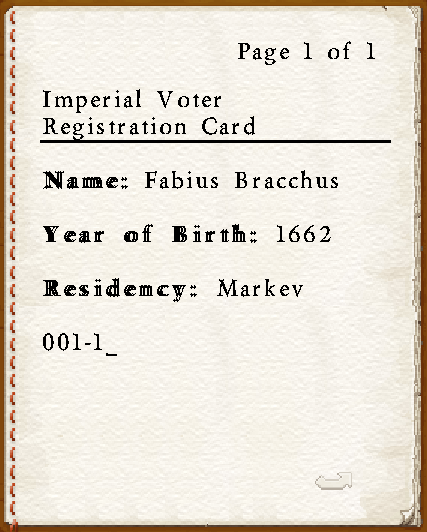
Upon submitting your request for a voter identification card, you may receive it from the I.E.C’s office in one to two business days. Office hours may vary. Upon receiving your voter registration papers, keep track of where you place them. They shall be prudent when voting in future elections.
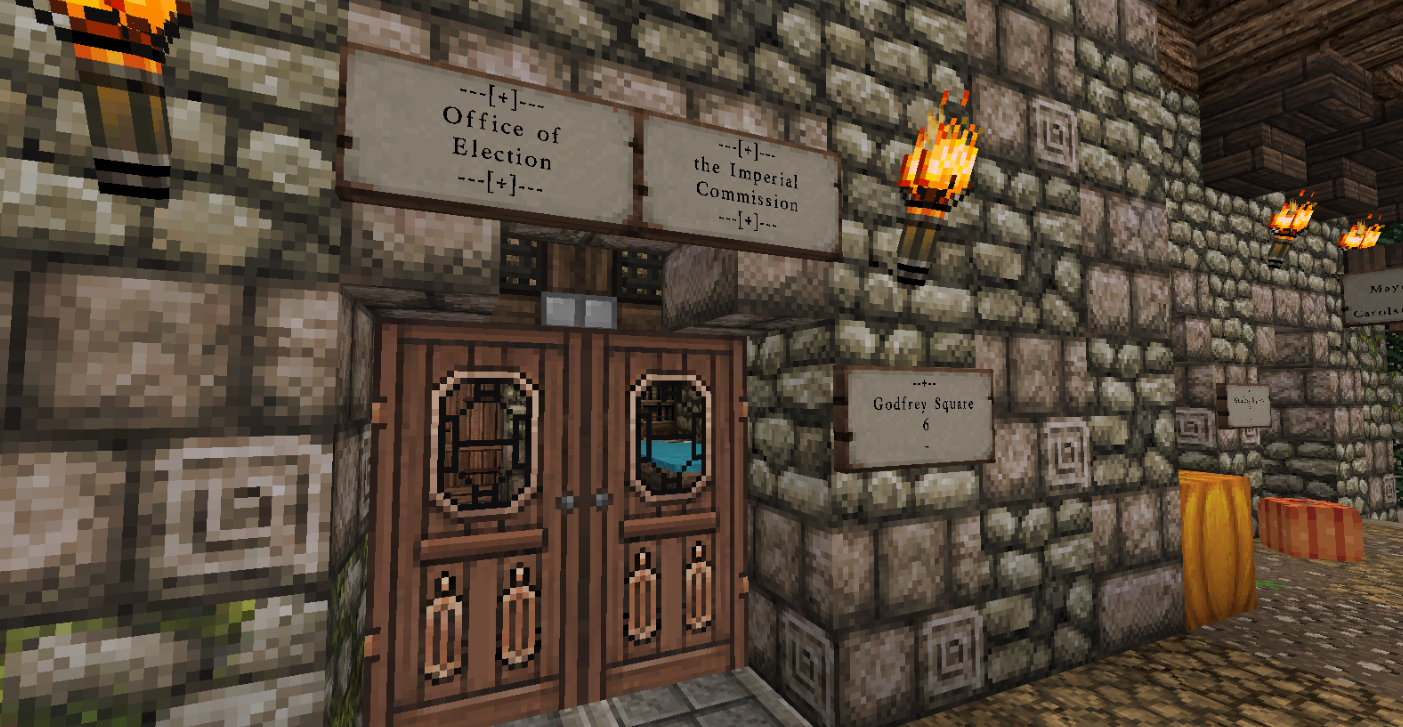
The I.E.C’s office, located at 6 Godfrey Square, Carolustadt
Again, you may only register to vote if you reside in one of the aforementioned charter cities.
Should you have any questions or complaints, please contact the Imperial Election Commissioner, Fabius Bracchus.

OOC Notes:
- You may register to vote with multiple personas, should they reside in an eligible city.
- You may only vote with one character in each prefecture.
- Contact Liam#7649 on Discord in regards to any questions.
11



BELVITZ SPECIAL PARLIAMENTARY ELECTION [1689]
in Atlas Roleplay Archive
Posted
The Belvitz By-Election of 1689
Per the breaking news of Prefect-elect John Hugh Sarkozic’s resignation, after accusations of the Imperial Administration attempting to “rig” the elections, the Statute of Carolustadt (V.II.IV) mandates that a special by-election be hosted to decipher the new Prefect of Belvitz. Currently, the runner up in the prior election, Ostrobor Carrion, is serving as the acting Prefect. He shall attend Parliamentary sessions until a new Prefect can be elected.
Standards for Political Candidates
Any individuals who wish to run for Prefect of Belvitz are asked to file for candidacy below. The standards for holding public office, per the Statute of Carolustadt, is as follows;
File for Candidacy
To apply for candidacy, please use the following application;
Full Name:
Prefecture:
Address:
Political Party:
By-Election Schedule
Candidacy Filing Date: ((11/2 – 11/5))
Primary Elections, Campaigns, and Debates: ((11/3 – 11/6))
By-Election Date: ((11/7))
Voter ID Card Reclamation
To any residents of Belvitz, please stop by the I.E.C’s office building at 6 Godfrey Sq. in Carolustadt, Renatus-Marna, in order to retrieve your card from the previous election. To contact a secretary, please submit a request to Election Commissioner Fabius Bracchus ((Liam#7649 on Discord))
We earnestly hope that you shall take interest in our democracy, either as a voter or candidate, and participate in our upcoming elections!
((Polls will be open from 3:00pm EST – 11:00pm EST on Wednesday, November 7th))